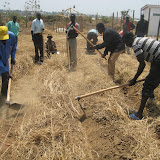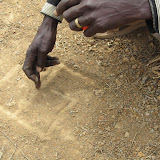Logo.
So the work is well underway in the village of Logo to prepare a ½ acre plot using the principles of conservation farming, known in 8 countries of Africa as Farming God's Way. Its exciting to see how the 19 farmers (9 members of Logo UMC and 10 of their village neighbors they invited) are working hard – and smart. They first cut a fire break around the plot, and back-burned it so that when (not if) the many fires that are set in the bush during the dry season reach the plot, it will not catch things on fire. Though there are not yet any crops to be damaged, and won't be until the March rains start, this fire break is still important since this method of farming surrounds the carefully spaced planting pits (maize) and furrows (groundnuts, sweet potatoes) with a 4-inch blanket of dried grass mulch that would flare up instantly.
But the progress I see is not just the fire break and straight rows of holes and furrows and the 3-pile compost system. It's also the willingness to defy the typical community-NGO relationship, and not demand everything be provided by the NGO. It's the willingness to undertake a development project as a spiritual covenant with explicit commitment for each side to partner by providing labor, materials, and prayer. It's the willingness to negotiate changes in the agreement, by offering to cut poles for fence posts in order to save money to be spent instead on extra tools and rubber boots. All this is possible because the project is based on a relationship in which there is trust, communication and flexibility. Because he trusted me, Pastor Simon tried a 6 x 7 meter plot of maize with this method, and it produced more than his neighbors. Because they heard him describe his success and they trust him, the members of his church agreed to let him organize them into a group to do this on a larger scale. Now as Alex Lupayi takes what I taught him and teaches them, he's developing a relationship in which the Logo farmers trust his teaching and advice. I've told them, and they've started to repeat it back, that when we use their demonstration plot as a teaching site for other villages it will be an inspiration and blessing to others who will trust that these village farmers, just like them, tried these methods and they worked.
In their own Kakwa language, their village name Logo means Strong.
Monday, February 6, 2012
Subscribe to:
Comments (Atom)















